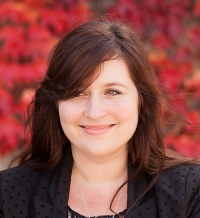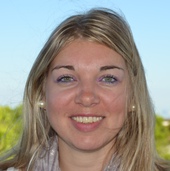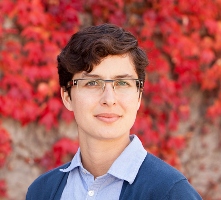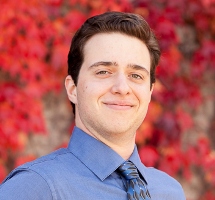Four Queen's students win Vanier scholarships
October 15, 2013
Share
By Wanda Praamsma, Communications Officer
Four Queen’s University students have won Vanier Canada Graduate Scholarships, which are designed to attract and retain world-class doctoral students and to establish Canada as a global centre of excellence in research and higher learning. Areas of studies include natural sciences and engineering, social sciences and humanities, or health sciences.
The winners receive a scholarship worth $50,000 each year for the next three years.
 Katherine Holshausen (University Communications Photo)
Katherine Holshausen (University Communications Photo)Katherine Holshausen (Clinical Psychology) – A PhD student in the Cognitive and Psychotic Disorders Lab, Ms. Holshausen is researching psycho-social outcomes in people with schizophrenia. Under the supervision of Professor Christopher Bowie, Ms. Holshausen works with individuals with mental illness from the community and several treatment groups in the lab to explore social cognition and how it relates to communication and social functioning among those with schizophrenia.
Schizophrenia is a fascinating disorder, as well as one of the most debilitating,” she says. “With many other disorders, people can relate in some way – with depression for example – but most people will never experience what someone with schizophrenia experiences. Working with this population is a constant source of inspiration. This award affords the opportunity to disseminate my work more broadly and, ultimately, incite real change in the lives of individuals with schizophrenia.”
For Ms. Holshausen, receiving the Vanier scholarship is a profound honour and an incredible opportunity to highlight psychologists’ role in the study and treatment of mental health. She hopes it will bring this mental health research to the forefront, setting the stage for more investment into research and treatment.
Sara Pavan (Political Studies) – A doctoral student from Italy who also won the prestigious Trudeau Scholarship this year, Ms. Pavan focuses her research on institutions in countries that are recipients of large immigration flows and what can be done to help newcomers become part of democratic politics. Her research is supervised by Keith Banting (Policy Studies and Political Studies) and Fiona Kay (Sociology).
 Sara Pavan (Alexia Pavan Photo)
Sara Pavan (Alexia Pavan Photo)In her work, Ms. Pavan compares a Canadian city with a long-standing commitment to multiculturalism to a more laissez-faire American approach. She studies how multicultural policies can impact what we call “social capital,” which in simple terms means “the people you get to know.” She then looks at how knowing a variety of different people encourages newcomers to become active in politics and to develop a trust in political institutions.
“It is a huge honour to receive the award and I think its biggest impact is in how much more, and more robust, data and information it allows you the time and resources to collect,” she says. “In my case, it provides me with the opportunity to spend time off campus and reaching out to a larger sample of the immigrant communities that are part of my study and, therefore, reach more robust inferences. This is a fantastic opportunity but, most importantly, it also provides an opportunity for better, higher quality data that can also provide better insights for policy-makers.”
Laura Schaefli (Geography) – Ms. Schaefli is researching the history of the Canada-U.S. border and the perceptions of First Nations and Métis regarding the surveying and mapping of Canada’s Great Lakes region undertaken by the International Boundary Commission between 1817-1827. Her supervisor is Professor Anne Godlewska.
 Laura Schaefli (University Communications Photo)
Laura Schaefli (University Communications Photo)A PhD student from Switzerland who completed her master’s at Queen’s, Ms. Schaefli says she became interested in this area after listening to and watching media stories and talking to people both within and beyond the academy about Indigenous perceptions and issues in Canadian society. She’s able to bring her position as a foreigner in Canada to her research, thinking through the settler dynamic and the tensions that arise, and the idea of inheriting injustices from the past.
“This award definitely means freedom, allowing me to expand the breadth of my research and giving me the opportunity to travel more,” says Ms. Schaefli. “It’s also recognition that this is an important question, and I hope it offers a push to educate the public about this period in history and current tensions in Canada, and how the responsibility should fall on everyone to think critically about this and to engage with it in a meaningful way.”
Daniel Vena (Gender Studies) – Mr. Vena is currently finishing his master’s at Queen’s, exploring transgender identities through the narratives of comic book characters, particularly Superman.
 Daniel Vena (University Communications Photo)
Daniel Vena (University Communications Photo)His research looks at how the Man of Steel and trans men may experience their bodies in similar ways. His doctoral work will continue in the sphere of transgender identities but with a focus on exploring the idea of chivalry and the necessity for alternative narratives within the transgender communities.
With an undergraduate degree in film and theatre, Mr. Vena’s research often moves through the lens of popular culture and he is active in both the Queen’s and Kingston cultural communities, recently co-founding Kingston’s first queer theatre collective with Professor Kim Renders (Drama).
Mr. Vena says the Vanier scholarship is a huge boost – offering stability, the opportunity to travel for research and conferences, and recognition. “For so long no one was talking or had even heard about trans identities,” he says. “I hope this scholarship helps push my work into the public sphere and further expose trans issues in the academy and beyond.”